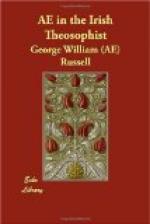Having digressed thus far from my subject, the point to which I proceed to address myself is, the working out on the individual of the system of which I have tried to shadow forth the greater truths. The first class I will deal with are the indifferent. To them, Theosophy presents the widest possible field of, and reasons for, activity that can be desired. It shows that no action is without its direct permanent result, and that consequently the position of the indifferent is absolutely untenable. No one who has studied Theosophical literature can ever find there a justification for mere laissez-faire. It points out the enormous value of what we call trifles, and the comparatively trifling value of what the indifferent would take most note. Theosophy always insists on action in some direction, preferably conscious, well-directed action, with pure motive.
The Agnostic is, as it were, Theosophy’s special care—It shows him at once the directions in which further, fuller, and greater knowledge of every branch of science or philosophy can be gained. It says to him “pursue your previous method of inquiry, and remember, taking nothing for granted, do not accept other’s authority. Seek for knowledge: we can only point the way we have ourselves gone. Investigate every nook and corner of your mind, and learn how to control it and your sense perceptions. Then you will no longer mistrust your results as possibly imperfect, but you will have attained to some closer contact with Truth.” To both the Agnostic and the indifferent, the study of Theosophy will bring a consciousness of the responsibility towards others, which is the basis of our universal brotherhood. It will tend to remove the personal element which has hitherto done so much to cloud and obscure one’s investigations; and it will gradually lead to the elimination of the anxiety as to results, which will bring us (by the removal of remorse or approval) to calmness of mind, in which condition great work can be achieved.
The appeal of theosophy to the scientific investigator is practically identical with the last. It will show him what so many of his confreres are more or less tacitly recognizing, that the hopeless and soul-deadening belief of the Materialist (that all the growth of the race, the struggling towards a higher life, the aspirations towards virtue shall absolutely vanish, and leave no trace), is a crushing mental burden which leads to absolute negation; it will show the spiritual nature of man in perfect consistence with the true theories, and as dependent on fundamental laws and causes.




